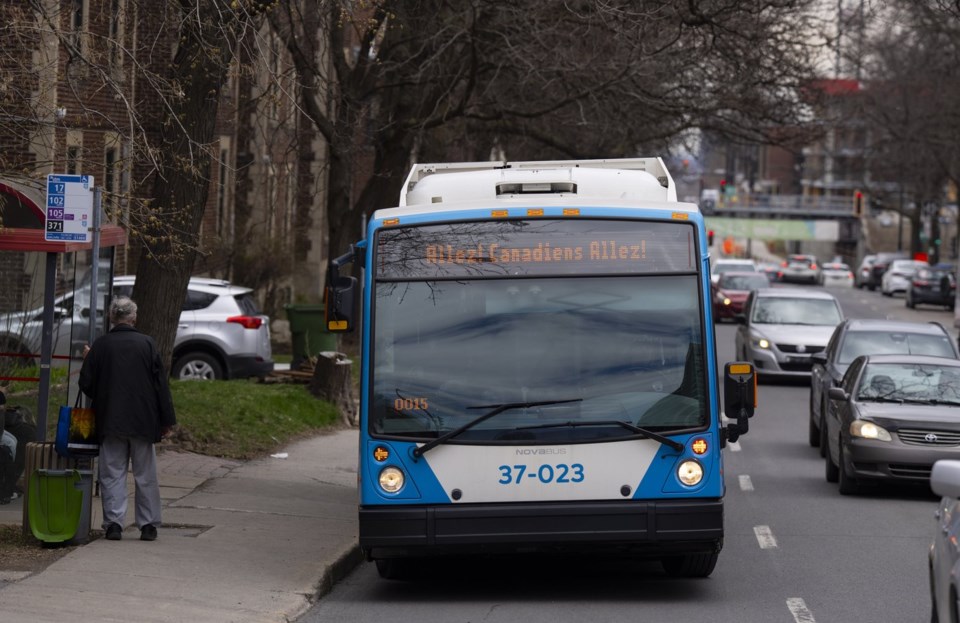MONTREAL ‚ÄĒ Quebec's language watchdog contacted the Montreal transit agency at least six times in the wake of a complaint about using the word "go" on city buses to cheer on a local soccer team.
The watchdog ‚ÄĒ the Office qu√©b√©cois de la langue fran√ßaise ‚ÄĒ asked for multiple updates on the agency‚Äôs efforts to remove the word, and kept the complaint open for nine months until ‚Äúgo‚ÄĚ had been scrubbed from more than 1,000 city buses in Montreal, according to emails obtained by The Canadian Press.
The correspondence contrasts with the office‚Äôs public comments responding to an April report in the Montreal Gazette that revealed how the transit agency had replaced the expression ‚ÄúGo! Canadiens Go!‚ÄĚ on its buses with ‚ÄúAllez! Canadiens Allez!‚ÄĚ to appease the watchdog.
The news report, coinciding with the Montreal Canadiens' first home game of the Stanley Cup playoffs, prompted a public outcry and elicited a declaration from French-language Minister Jean-Fran√ßois Roberge in support of the expression ‚ÄúGo Habs Go!‚ÄĚ
At that time, the watchdog said it had ‚Äúcontacted the (transit agency) to inform it of the complaint and remind it of its obligations under the (French-language) charter.‚ÄĚ But the office didn‚Äôt share details about the length of its review and the number of times it pressed transit officials for updates.
The internal correspondence reveals how an adviser for the language office sent at least six emails to the transit agency between May 2024 and January 2025, informing the agency of a complaint and asking about its plans to fix the problem. The documents were obtained under access-to-information law.
The complaint, received on April 29, 2024, related to city buses displaying the expression ‚ÄúGo! CF Mtl Go!‚ÄĚ ‚Äď a reference to Montreal‚Äôs professional soccer club.
The transit agency initially responded to the language office in June 2024, explaining that such slogans give bus drivers ‚Äúa way to salute national sports teams.‚ÄĚ
Using the word ‚Äúgo‚ÄĚ kept the message shorter and prevented it from scrolling across the buses‚Äô electronic displays, the email explained. Still, the agency agreed to remove the word, but warned the process could take several months.
In response, the adviser asked why the change couldn‚Äôt be made ‚Äúover a few days when the vehicles are in the garage.‚ÄĚ The transit agency replied that each bus had to have its display changed manually, using a USB key.
In July, the language watchdog informed the agency that the complaint would remain open until all the buses had been changed. The adviser then followed up two more times over the fall and winter to request updates.
Eventually, the transit agency reported in January that 1,002 of its 1,104 buses had been updated, and the remaining 102 buses were out of service. The language office then agreed to close the complaint, on condition that each of the remaining buses would be updated before returning to service.
In an email statement to The Canadian Press, a spokesperson for the language watchdog said the correspondence is ‚Äúpart of a normal process for handling a complaint.‚ÄĚ
The language office never received a complaint about ‚ÄúGo Habs Go‚ÄĚ and was never informed that the transit agency was planning not to use the word ‚Äúgo‚ÄĚ in relation to the hockey team, said Gilles Payer.
He said the office would not have pursued a complaint about ‚ÄúGo Habs Go,‚ÄĚ since the expression is a trademark, which does not need to be translated.
A spokesperson for Roberge told The Canadian Press the minister was not aware of the issue until the change was first reported in April.
But the documents show his own department was informed of the complaint shortly after it was received and intended to participate in the review. According to Quebec’s French-language charter, complaints involving public bodies must be flagged to the French-language department.
The department did not respond to questions about its role in response to this complaint.
Roberge‚Äôs spokesperson Thomas Verville said the language office received more than 10,000 complaints last year. ‚ÄúThe minister does not intervene in the complaints received‚ÄĚ by the office, he said. ‚ÄúThat would be political interference.‚ÄĚ
Still, Roberge announced in April that he had held ‚Äúseveral discussions‚ÄĚ with the language office, and that any future complaints about the expression ‚ÄúGo Habs Go‚ÄĚ would ‚Äúbe deemed inadmissible.‚ÄĚ He said the slogan has been used for decades to support the Montreal Canadiens. He also said employees of the language office were receiving threats.
Verville said there is a ‚Äúhuge difference‚ÄĚ between using the word ‚Äúgo‚ÄĚ in reference to the Montreal soccer team as compared to the Montreal Canadiens. He said fans of CF Montr√©al typically chant ‚ÄúAllez Montr√©al‚ÄĚ during matches, while ‚ÄúGo Habs Go‚ÄĚ has long been part of Quebec culture.
He added Roberge spoke out specifically to defend the expression ‚ÄúGo Habs Go,‚ÄĚ which was not the subject of the original complaint. He did not say whether the minister opposes the use of the word ‚Äúgo‚ÄĚ in reference to other sports teams.
A spokesperson for the transit agency said it is still in discussions with the language office to ‚Äúobtain official confirmation that we are allowed to use the word ‚Äėgo‚Äô in a sporting context and that we will not be penalized if we do so.‚ÄĚ
The agency says no change will be made before the buses undergo regular maintenance in the fall.
This report by The Canadian Press was first published May 30, 2025.
Maura Forrest, The Canadian Press




